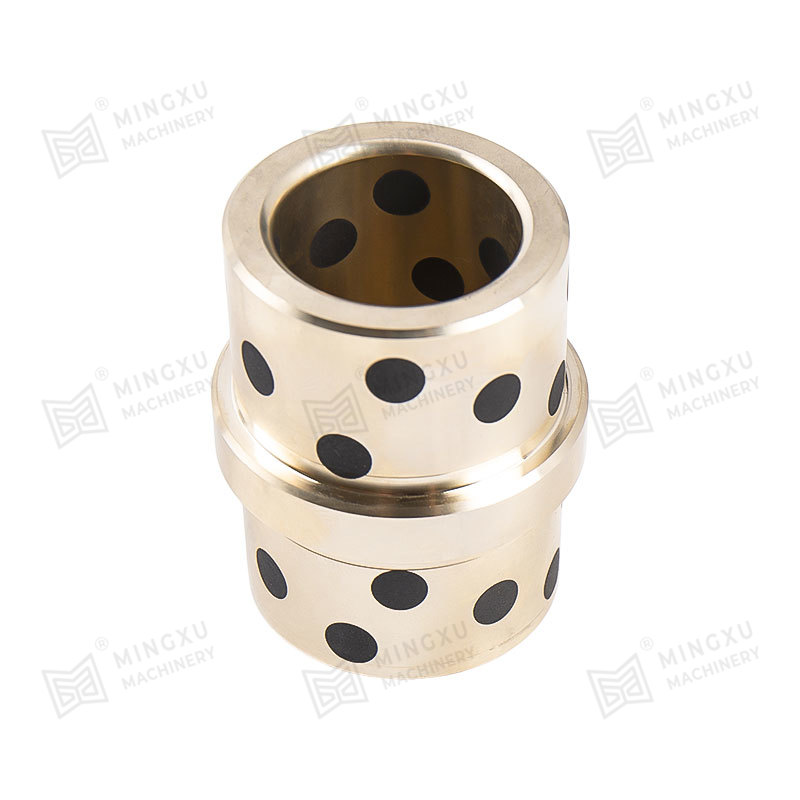MXB-JDBU Self-Lubricating Casting Bronze Bearing
Cat:Self-Lubricating Bearing
MXB-JDBU Self-Lubricating Casting Bronze Bearing is a high-performance solid lubricating product inlaid with graphite or mos2 solid lubricant on a hig...
See DetailsWhen evaluating the performance of bearings in various applications, noise reduction is a crucial factor, especially in industries where equipment operation must meet stringent acoustic standards. Solid-lubricating bearings have gained attention for their potential advantages in this area compared to traditional liquid-lubricated bearings.
Mechanism of Noise Generation
Noise in bearings primarily arises from vibrations and friction between moving components. Traditional bearings, which rely on liquid lubricants, can generate noise due to the movement of the lubricant itself and the potential for cavitation or turbulence within the lubricant film. As these bearings wear, changes in the lubricant's viscosity and contamination can further exacerbate noise levels.
Advantages of Solid-Lubricating Bearings
Reduced Friction: Solid-lubricating bearings utilize materials such as graphite, PTFE, or molybdenum disulfide, which inherently produce lower friction coefficients than many liquid lubricants. This reduced friction can lead to quieter operation, as there is less mechanical vibration generated during movement.
Consistent Lubrication: Unlike liquid lubricants that may degrade over time or need replenishment, solid lubricants provide consistent performance throughout their lifespan. This stability helps maintain quieter operation, as the lubricating properties do not fluctuate due to changes in temperature or operating conditions.

Damping Properties: Solid lubricants can absorb and dissipate vibrations more effectively than liquid lubricants. This damping effect can contribute to reduced noise levels during operation, making solid-lubricating bearings particularly beneficial in applications where noise reduction is a priority.
Reduced Contamination: Solid-lubricating bearings are less susceptible to contamination from dust and debris, which can lead to increased wear and noise in traditional bearings. Their robust nature allows them to maintain performance in harsh environments, further contributing to quieter operation.
Limitations and Considerations
While solid-lubricating bearings generally offer advantages in noise reduction, their effectiveness can vary based on specific application conditions. Factors such as load, speed, and the specific solid lubricant material used can influence overall performance. Additionally, while they excel in high-temperature and extreme environments, they may not always provide the same load-bearing capabilities as liquid-lubricated bearings in every scenario.
Solid-lubricating bearings can significantly reduce noise compared to traditional liquid-lubricated bearings due to their lower friction, consistent performance, and inherent damping properties. As industries continue to prioritize quieter operations, the adoption of solid-lubricating bearings is likely to increase, offering not just functional benefits but also improvements in acoustic performance. This makes them an attractive option for a wide range of applications, from automotive to industrial machinery.

MXB-JDBU Self-Lubricating Casting Bronze Bearing is a high-performance solid lubricating product inlaid with graphite or mos2 solid lubricant on a hig...
See Details
SF stands for three-layer composite, namely steel plate layer, copper powder layer and plastic layer. The steel plate layer plays the role of assembly...
See Details
The MXB-DUF oil-free composite bearing, also known as the SF-1F bushing, is a three-layer composite structure bearing. It typically consists of a stee...
See Details
MXB-DX boundary oil-free bearings, equivalent to SF-2 self-lubricating or dry plain bearings, which is based on steel plate, sintered spherical bronze...
See Details
MGB9834 DIN9834 standard guide bushing complies with DIN9843 standard and is suitable for European automotive stamping dies. It is designed to provide...
See Details
MGB61 NAAMS Standard Guide Bushing is a reliable solution for precise, smooth guide applications. This guide bushing is designed to meet NAAMS standar...
See Details
SF-1W lead-free bearing is a new product developed based on SF-1X material according to international environmental protection requirements. In additi...
See Details
SF-1S stainless steel corrosion-resistant bearing is a very effective corrosion-resistant material that is formed by rolling with stainless steel as t...
See Details
SF-1SS is a highly corrosion-resistant and wear-resistant bearing made of stainless steel as the base material and PTFE sprayed on the surface. This m...
See Details
SF-PK PEEK triple composite bearing is a novel sliding bearing, which consists of steel plate, copper powder layer, PTFE + filling material. The main ...
See Details
Contact Us